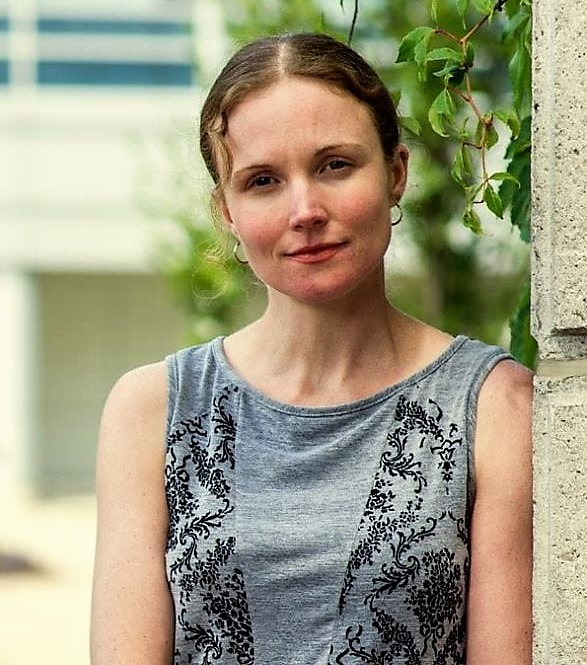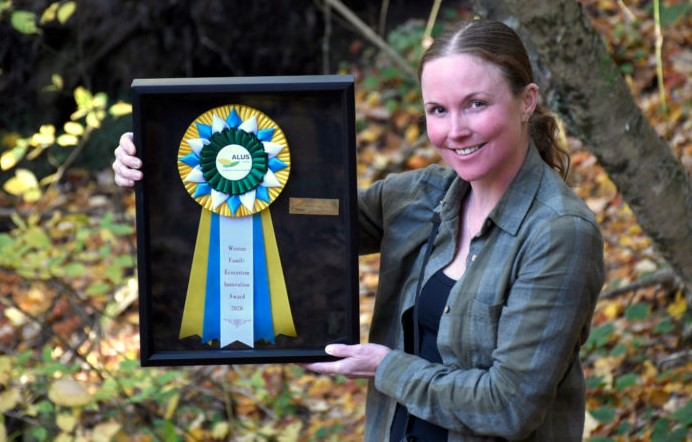
Helping to balance environmental protection and agricultural production is among the goals of research that has netted a prestigious award this year for University of Guelph biologist Amy Newman.
A professor in the Department of Integrative Biology, Newman becomes the third U of G faculty member to receive the Weston Family Ecosystem Innovation Award since the biennial award was established four years ago.
Previous winners were Prof. Wanhong Yang, Department of Geography, Environment and Geomatics, in 2018 and integrative biologist Andrew MacDougall in 2016.
The award honours researchers or ALUS partners for excellence and innovation in research and monitoring or verification of ecosystem services produced on farmland for the broader public good.
ALUS is a Weston Family-supported national program that helps farmers and ranchers to clean up air and water, increase biodiversity and provide other ecosystem services by promoting wetlands, stream protection zones, tallgrass prairie or other ecosystems on agricultural land.
Newman said the award recognizes her studies of how farm practices and land use affect wildlife habitat and species diversity – a critical topic as researchers including numerous U of G scientists at Canada’s “food university” look for more sustainable ways to feed a growing human population.
“To have recognition of the importance of biodiversity is really exciting,” said Newman, who arrived at U of G in 2010 as a post-doctoral researcher. She became a faculty member in 2012.
“Wildlife is on the front line of the human-environment tension zone. This award demonstrates that there is widespread interest and awareness about these issues.”
 Malcolm Campbell, vice-president (research), said, “Professor Newman’s work validates and supports vital efforts to feed the world and protect our environment. The fact that three of our researchers have now received this prestigious award demonstrates the integral role of University of Guelph research in ensuring sustainable agri-food practices that improve life for us all.”
Malcolm Campbell, vice-president (research), said, “Professor Newman’s work validates and supports vital efforts to feed the world and protect our environment. The fact that three of our researchers have now received this prestigious award demonstrates the integral role of University of Guelph research in ensuring sustainable agri-food practices that improve life for us all.”
Working with ALUS for the past two years, Newman has studied songbirds and their habitat – including sparrows, swallows, eastern bluebird, bobolink and eastern meadowlark – on livestock and cash crop farms in Norfolk County on Lake Erie. More than 900 farmers and ranchers in six provinces are enrolled in the ALUS program, representing more than 27,000 acres of land.
Learning about impacts of farming and restoration on bird stress levels may help inform conservation policy and balance sometimes conflicting agricultural and environmental needs, Newman said.
Referring to a 2019 study by American and Canadian researchers, she said, “Grassland songbirds have experienced one of the steepest declines since 1970 and thus restoration might be particularly important for those species.”
Preliminary data show that ALUS farms with habitat restoration practices support greater diversity of bird species, especially insect-eaters.
“Agricultural landscapes and urban landscapes are two of the fastest-growing landscapes on the planet. How do we feed an increasing population in a sustainable way?” said Newman, who grew up on a family farm near Pickering, Ont.
“Detecting declines in wildlife on these changed landscapes is an enormously important alarm bell that the ecosystem is under threat of collapse.”
“This program is all about valuing nature and the work our farmers do to restore nature,” said ALUS CEO Bryan Gilvesy, whose Norfolk County livestock farm belongs to the program. “We’re connecting the community of research to the community of practice.
Referring to numbers of birds and pollinators on his farm, he said, “We have found that biodiversity responds very quickly to farmers’ work. It’s almost ‘build it and they will come.’”
Newman’s grandfather, William Gould Newman, a former Ontario MPP and cabinet minister, developed the Foodland Ontario program to promote homegrown agricultural products as minister of agriculture and food beginning in 1975. A graduate of the Ontario Agricultural College at the University of Guelph, he married Molly Mitchell, a grad of U of G’s Macdonald Institute.